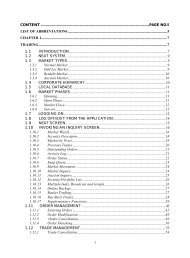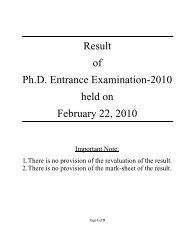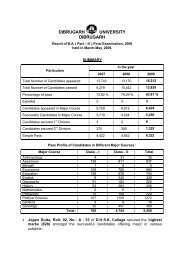Document file:///D|/Export1/www.netlibrary.com/nlreader/nlreader.dll ...
Document file:///D|/Export1/www.netlibrary.com/nlreader/nlreader.dll ...
Document file:///D|/Export1/www.netlibrary.com/nlreader/nlreader.dll ...
You also want an ePaper? Increase the reach of your titles
YUMPU automatically turns print PDFs into web optimized ePapers that Google loves.
<strong>Document</strong><br />
Page 6<br />
how our notion of what is proper has changed over time. (I'll say more on the subject later in this lecture<br />
and elaborate further in the third lecture). But what seems clear to me is that the reason that the<br />
development theory that emerged in the 1940s and the economic geography that emerged more or less<br />
in parallel failed to "make it" into mainstream economics was the inability of their creators to express<br />
their ideas in a way suitable for the modeling techniques available at the time. In both development and<br />
geography the crucial problem, in particular, was the inability of the field's pioneers to be explicit about<br />
market structure that is, about the conditions of <strong>com</strong>petition in the hypothetical economies they were<br />
describing. It's a subtle problem; indeed, it is virtually impossible to explain why it is an issue at all to<br />
anyone who has not tried to engage in serious economic modeling. And yet the market structure issue<br />
proved fatal to efforts to integrate both development and geography into the mainstream of economic<br />
theory.<br />
All this may sound fairly abstract. So let me turn to my first example: the story of the rise, fall, and<br />
resurrection of development economics.<br />
Once upon a time there was a field called development economics a branch of economics concerned<br />
with explaining why some countries are so much poorer than others, and with prescribing ways for poor<br />
countries to be<strong>com</strong>e rich. In the field's glory days in the 1950s the ideas of development economics<br />
were regarded as revolutionary and important, and <strong>com</strong>manded both great intellectual prestige and<br />
substantial real-world influence. Moreover, development economics attracted creative minds and was<br />
marked by a great deal of intellectual excitement.<br />
<strong>file</strong>:///<strong>D|</strong>/<strong>Export1</strong>/<strong>www</strong>.<strong>netlibrary</strong>.<strong>com</strong>/<strong>nlreader</strong>/<strong>nlreader</strong>.<strong>dll</strong>@bookid=409&<strong>file</strong>name=page_6.html [4/18/2007 10:28:41 AM]
















